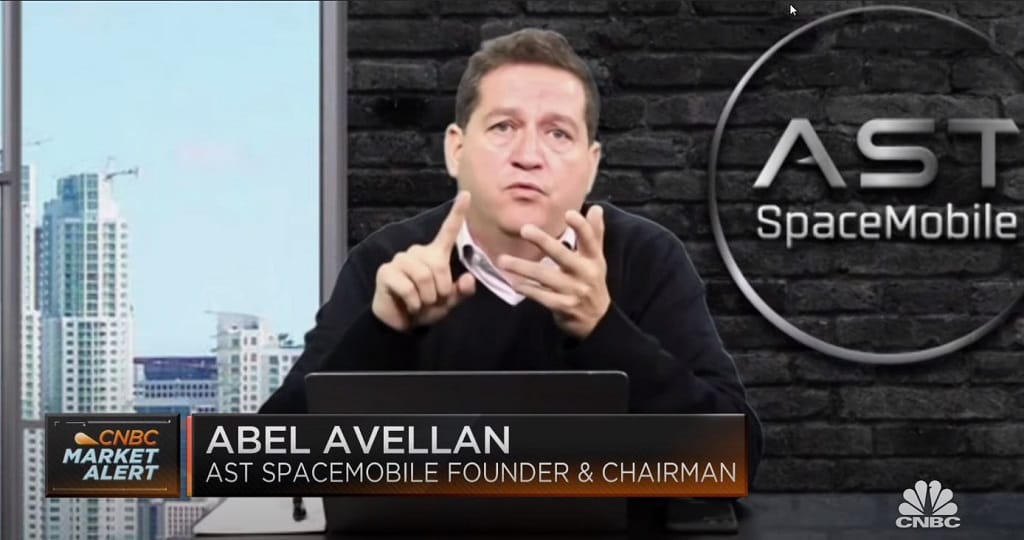ATS SpaceMobile Testing Satellite-to-Cell Tech, Simington on Twitter Deal, Lawmakers Call for Better Facebook Oversight
ATS will test technology allowing LEO satellites to provide direct connectivity to cellphones.
Teralyn Whipple

May 4, 2022 – AST SpaceMobile said Monday that the Federal Communications Commission awarded it an experimental license to test technology that would allow its satellites to connect directly with cell phones for connectivity.
For the trial, the company is partnering with American Tower, Rakuten Mobile, and Vodafone, the latter two investors in the project. Once in orbit, it will conduct testing of the technology in the U.S. and Japan with Rakuten.
It added in the release that its low-earth orbit BlueWalker 3 satellite, which uses low-band cellular airwaves and is preparing for launch this summer, will help “eliminate the connectivity gaps faced by today’s five billion mobile subscribers moving in and out of coverage zones, and bring cellular broadband to approximately half of the world’s population who remain unconnected.
“We appreciate the diligent support of the FCC in providing the experimental license for our upcoming satellite launch,” said AST SpaceMobile CEO Abel Avellan. “Together with other testing around the world, this license will enable us to conduct some of our most important testing here, at home, in the United States.”
AST would be the latest to try and beam broadband capacity to the ground. SpaceX’s Starlink has thousands of LEO satellites — which fly closer to the earth’s surface for faster connections — in space and is currently providing direct-to-consumer home internet service. AST said it will allow smartphones to connect without specialized satellite hardware.
“SpaceMobile will … help the world’s most under-served communities to access the latest mobile services much sooner than predicted,” said Avellan.
FCC Commissioner Simington says agency doesn’t have jurisdiction to block Twitter deal
In a statement on Monday, FCC Commissioner Nathan Simington said the agency has not authority to block SpaceX CEO Elon Musk’s acquisition of social media platform Twitter and, even if it did, it shouldn’t.
“Nothing in the United States Code or our regulations gives us the right to interfere with this transaction,” Simington said in the statement. “Our competition review authority does not and has never extended to internet platforms like Twitter.
“But even if this deal were within our purview, it would be inappropriate and contrary to the public interest to block it,” he added. “Mr. Musk’s acquisition does not raise any concerns about vertical or horizontal concentration in the social media market, and there is no reason to think it would otherwise limit competition or harm consumer welfare.”
Simington argued that the acquisition will “enhance competition and better serve those Americans, the majority, who value free speech” if Musk follows through on stated intentions to ease restrictions on speech, of which the billionaire has been critical in the leadup to the deal.
Simington’s comments come a week after Twitter’s board agreed to sell the company to Musk for $44 billion. Simington joined fellow Republican on the commission Brendan Carr in suggesting the FCC doesn’t have the authority to block the transaction.
The comments come after the Open Markets Institute called on regulators late last month to block the transaction, claiming that the deal “poses a number of immediate and direct threats to American democracy and free speech.”
US, EU lawmakers call on enhanced oversight of Facebook
Several US and European lawmakers are calling for better oversight of Facebook’s compliance with existing regulations protecting users’ privacy, according to a Monday report from Vice.
The calls follow a Vice investigation that, citing a leaked internal document, claims the social media company’s systems are “designed in such a way that the company can struggle to track users’ data within its own systems.”
Senator Ed Markey, D-Mass., told Vice that, “I’m concerned that these revelations are much more than simply a breach of consumer trust but an open door for specific threats of harmful data uses.”
Senator Martha Blackburn, R-Tenn., said on Twitter that, “Facebook has lost control of what they are doing with your data. This is reckless and threatens the privacy and security of Americans.” She called for a national privacy law.
The European parliament is close to putting into force laws that will regulate tech companies, including the Digital Services Act and Digital Markets Act. These laws will limit data use and profiling for advertising purposes.










Member discussion